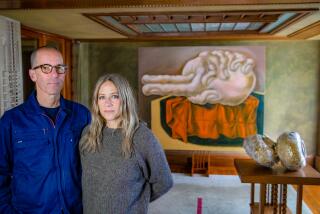Architectural Historian Henry-Russell Hitchcock
NEW YORK — Henry-Russell Hitchcock, considered the dean of America’s architectural historians and teachers, has died of cancer at the age of 83.
Hitchcock died here Thursday.
“Of our generation, he was the leader of us all,” architect Philip Johnson said. “He set a new standard of architectural scholarship and accuracy of judgment. In my opinion, the standard has yet to be equaled.”
Hitchcock’s books on architectural history became standard references.
“They are the armature within which many other scholars work,” said Helen Searing, another architectural historian.
Hitchcock, a native of Boston, began his career as a writer while he was still a student at Harvard University, where he was part of a circle of intellectuals who advocated modernism in the arts. He was among such authors as T. S. Eliot, Virgil Thompson and Lincoln Kirstein writing for the Hound and Horn.
Before he was 30, he had written “Modern Architecture: Romanticism and Reintegration.” He also wrote “The International Style” with Johnson in 1932 and helped organize an influential exhibition in 1932 on the then-radical architectural style at the Museum of Modern Art in New York.
He was credited with fostering the concept that modern architecture is an artistic style, not just a functional way of building.
The more than 20 books Hitchcock wrote or co-wrote also included studies of the architecture of other periods, such as his last, published in 1981, “German Renaissance Architecture” and “Early Victorian Architecture in Britain.”
He also wrote reviews of Marcel Proust and Virginia Woolf and helped arrange the premiere of Thompson’s and Gertrude Stein’s opera, “Four Saints in Three Acts.”
He taught at Vassar College, Wesleyan University, Smith College, Yale University and, most recently, New York University. From 1949 to 1955, he was director of the Smith College Museum of Art.
More to Read
The biggest entertainment stories
Get our big stories about Hollywood, film, television, music, arts, culture and more right in your inbox as soon as they publish.
You may occasionally receive promotional content from the Los Angeles Times.










